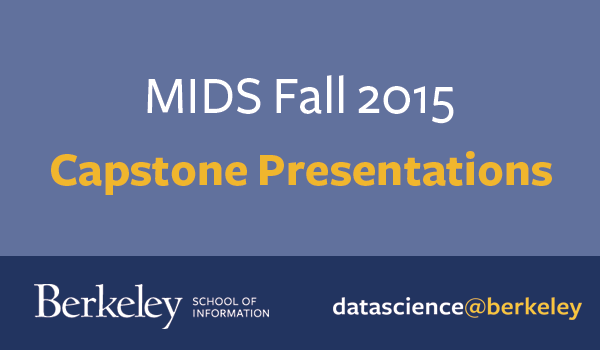datascience@berkeley Fall 2015 Capstone Presentations

On January 6, the fall 2015 datascience@berkeley graduates presented their capstone projects in a public webinar — marking the culmination of their journey through the two-year program. For the capstone project, the graduates were challenged to present a real-world situation or problem and apply their newly honed data science skills in communication, problem-solving, influence, and management to provide a fully realized solution. Many graduates used this opportunity to solve problems that the average person faces every day.
Below we’ve compiled a list of the capstones, short descriptions of each, and links to learn more about the projects.
- Ross Boberg, Kevin Allen, Shelly Stanley, and Younghak Jang
- We use advanced statistical methods to analyze historical data to predict player performance. Using probability distributions, we show how likely a player is to exceed or fall short of expectations.
Early Outbreak Detection and Monitoring
- Christopher Walker, David Rose, and Wei Shi
- Our outbreak identification and monitoring system brings together multiple global data sources to identify and track disease-related activities around the world. The goal is to provide a rapid identification system through daily monitoring and analysis of web-based news media and social media sources. Users can access a dashboard of current< events and quickly view all of them or explore individual events in more detail.
- Matthew Hayes, Douglas Kelley, Alexander Risman, and Chula Watugala
- Is that deal tweet you just got really a good deal? DealTrader will figure out if you can get the same product for less someplace else. Using natural language processing and machine learning techniques, we can grab the information from the tweet, kick off a search of other common vendors (like Amazon and eBay) and let you know right away if that price is really a good deal or not.
- Arthur Mak, Rosalind Lee, and Doug Kang
- Instaplaces caters to the next generation of tech-savvy travelers. These are people who are just starting to plan their next vacation and are looking to explore hidden gems that are selected just for them — locations that are off the beaten path and not on any impersonal, cookie-cutter “Top 10” lists. Ultimately, hyper-personalized recommendations are the differentiating factor that can increase user engagement and lead to more conversions for travel sites.
Learn more about datascience@berkeley.
Citation for this content: datascience@berkeley, the online Master of Information and Data Science from UC Berkeley

